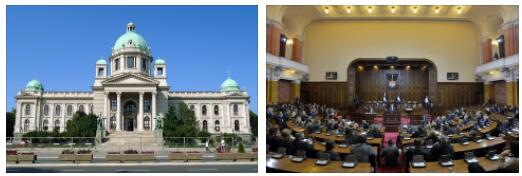The political system of Serbia is characterized by structural problems that still hinder the democratic and constitutional transformation, which is why the transformation processes after the 1990’s were not linear, followed by negative, authoritarian setbacks in recent years. A good indicator of development is the Freedom House Freedom Index for Serbia. Due to political developments, in 2019 the organization downgraded Serbia from “free” to “partially free” for the first time in years, which referred to individual civil rights, but even more to political rights. The country only scored 67 out of a maximum of 100 points compared to 73 in the previous year. This negative trend continued in 2020 with only 66 points.
Parliamentarism
The legacy of the 1990’s is having an impact on the work of the Serbian parliament, when the introduction of a multi-party parliament was travestated by the authoritarian concentration of power under President Milošević. Therefore democratic parliamentarism in Serbia remains weak today. It is true that parliament is the site of political disputes. In 2010, for example, an attempt by the SNS to shift political events into the extra-parliamentary sphere through a hunger strike by its party leader Nikolić failed. But parliament remains weak in exercising its legislative function. In particular, Parliament’s control over the implementation of passed laws remains inadequate. At the same time there are tough ideological debates and verbal failures, especially of the nationalist right on to everyday parliamentary life. One of the main reasons for the weakness of parliamentary work is the authoritarian concentration of power in the party and faction leadership. Before the parliamentary elections in May 2012, under pressure from the EU, some of the legal regulations that had previously guaranteed extensive control of elected officials by the party leadership were abolished. After the change of government in summer 2012 and the crisis of the largest opposition party, the DS, parliamentary work suffered mainly from the weakness of the opposition, which was more concerned with internal turmoil than seemed to be concentrated on the work of the governing parties.
With the result of the parliamentary elections in 2014, the opposition lost virtually all influence in parliament, and the SNS gained a wealth of power that even Slobodan Milošević was not granted in the 1990’s. Due to the increasingly authoritarian powers of the head of government and chairman of the traditionally authoritarian party, the parliamentarians of the SNS have the function of waving through proposed bills. Overall, the government coalition led by the SNS, which is itself extremely authoritarian within the party, has seen a considerable degradation of the work of the Serbian parliament since 2012. A large part of the proposed legislation is being rushed through parliament. The President of Parliament Maja Gojković uses her powers to partly in violation of the parliamentary order, excessively to curtail the rights of the opposition. At the same time, the SNS representatives in parliament have started to prevent serious parliamentary deliberations on laws introduced by their government by bombarding the legal representation with a large number of legislative amendments. This practice was only stopped again in 2019 under pressure from the EU. Taken it all together Parliamentarianism in Serbia has also weakened considerably in recent years.
With the return of Vojislav Šešelj and the other ultra-nationalist parties DSS and Dveri in 2016, the parliamentary culture in the newly formed House of Representatives suffered further and debates are even more controversial than before. At the same time, the MPs of the movement party Dostajebilo have excelled with a loud exchange of blows with the governing parties and open resistance to the leadership style of the parliamentary president since entering parliament in 2016. Thus, parliamentary work is again marked by greater ideological-political differences than in the two years before.
Since February 2019, the members of the parliamentary parties belonging to the Alliance for Serbia have boycotted the parliament. According to ehistorylib, with only 3 parties entering the Serbian parliament in the June 2020 elections and the ongoing government formation negotiations (at the end of September 2020), in which an alliance of all three parties is being discussed, there is a possibility that Serbia could even enter the country without a formal parliamentary opposition will stay. At the same time, since the June elections the constitution of the new parliament has still not taken place.
